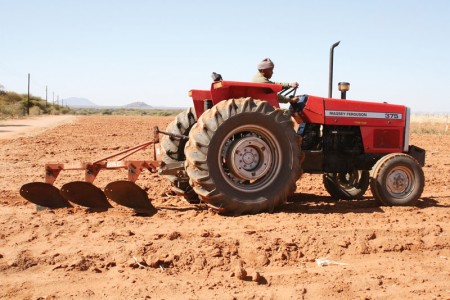Cry the beloved Barolong farms
Tumelo Mouwane | Friday April 1, 2016 16:18


Over the past years, Barolong region has lost its position as the granary of Botswana. While the area used to record an average rainfall of over 500 millimetres, over the years the area’s ploughing season has been experiencing shorter raining and ploughing seasons, resulting in lower yields.
As usually, at the beginning of the ploughing season late last year, Barolong farmers thronged Agricultural Crop Department offices in Goodhope to enjoy government assistance with seeds and fertilisers. Most farmers were hopeful that there would be ample rains prior to winter to sustain their crops. However, the farmers have now lost hope.
Those who have shifted from ploughing maize are hopeful for some harvest. But many have long thrown in the towel. Beans and related crops have survived as government had advised.
In Tlhareselele village, Mmegi met Boikanyo Moilwa, who watched horrified as her fields lay desolate due to the dry spell that swept and fried everything in its wake, before the last rains. Loss of hope, was quickly followed followed by despair and she gave in and let in livestock to graze on the failed maize crops.
“This year’s ploughing season was a total failure in Borolong, especially some of us who can’t afford expensive hybrid seeds. The sun was so harsh and there was no rain at all. I had given up hope prior to the latest rains. I had ploughed largely maize and half a hectare of Setswana beans. My maize did not grow. It stayed in one stunted level for a while.
“It was now becoming pale and I decided to at least allow my livestock to graze on it. The beans gave me hope, but I was overwhelmed by disappointment because of less rain and thought I should just wait for next season,” mused Moilwa.
A farmer in Madingwane lands, Tebogo Morwe shared Moilwa’s sentiments. Morwe said it was high time Batswana accepted that the climate has changed, and that the ploughing season must change.
“I had poured resources in my 15-hectare field but it looks like I am going to make historic loss this year. I had hope that I will at least get 40 or more bags of maize and few bags of beans but it looks like all my hopes have been shattered.
“The climate conditions across the globe have rapidly changed and it’s high time we change our ploughing seasons too. Rains come late and winters are delayed. We must consider alternating our ploughing season. I think BAMB facilities will stay empty this year unless they import from South Africa since even the early maturing seeds failed to survive,” Morwe said.
The station manager at Goodhope Agricultural research centre, chief technical officer, Oduetse Chepete said some crops have long suffered moisture stress and succumbed, except for a few long-rooted crops. The centre is a government institution, whose mandate is to carry out scientific research in Barolong farms and advice farmers.
“We have our trial seedlings in our field which we use to carry out investigations on crop situations and recommend technical measures to farmers. We have since realised from this year’s trial crops that there will be less or no yields this year in our farming area,” Chepete said.
Chepete was not hopeful that this year’s ploughing season would have some positive effect due to prolonged moisture stress. He noted that plants went through a long period of trauma, hence resulting in stunted growth.
“The rains came at a little bit odd time as plants had already suffered a lot of moisture stress. Some plants, especially maize, suffered stunted growth due to insufficient moisture. Germination was not a problem since there was enough moisture when the seeds were buried. They needed rainfall to sustain through,” he said.
In Chepete’s assessment, had the rains come in time, the plants would have survived through the harsh temperature conditions. “There were extremely outrageous temperatures late last year and early this year. These high temperatures affected the crops but few crops, non-cereals, will survive,” said Chepete.
The officer was hopeful that some, who had opted to plant beans and related crops, would harvest something.
“Non-cereals are better naturally equipped to sustain through harsh conditions. They have long-rooted systems to reach moisture underground as compares to cereals like maize. Farmers who had planted such will not walk home empty-handed. Beans, especially Cowpeas, Tlong peas and Bambara Tapery kind would survive,” Chepete said.
Chepete said one of the largest contributors in agricultural sector, Mosesedi farms, has experienced the same challenges of stunted growth. It was the same situation at Mosi lands farms, where plants had given in before the start of the last rains.
Thankfully, said the officer, the region has not experienced challenges of pests but encouraged farmers to immediately report such to his office if they experience any attack.
The recent rains have also brought some hope in livestock breeding. Many livestock farmers feel they would not suffer the high death toll of previous years as the recent rains have left flowing rivers and pasture ahead of the harsh winter season.
